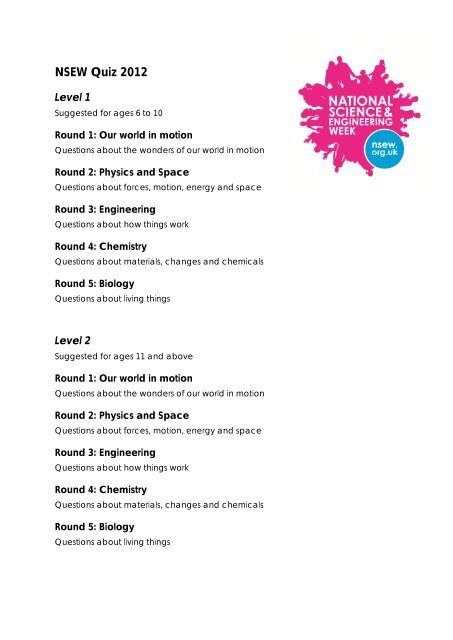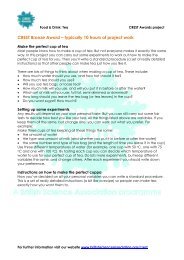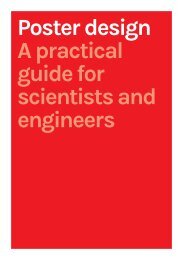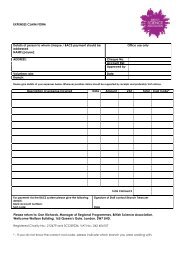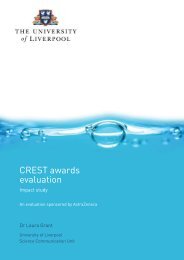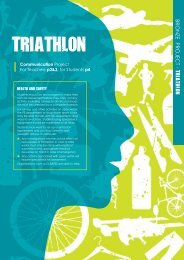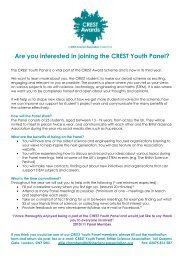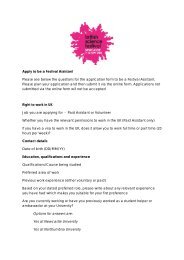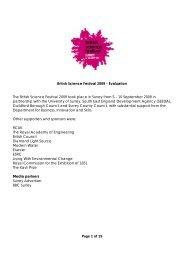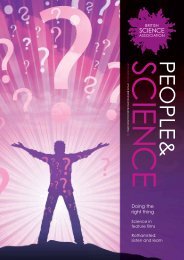NSEW Quiz 2012 - British Science Association
NSEW Quiz 2012 - British Science Association
NSEW Quiz 2012 - British Science Association
You also want an ePaper? Increase the reach of your titles
YUMPU automatically turns print PDFs into web optimized ePapers that Google loves.
<strong>NSEW</strong> <strong>Quiz</strong> <strong>2012</strong><br />
Level 1<br />
Suggested for ages 6 to 10<br />
Round 1: Our world in motion<br />
Questions about the wonders of our world in motion<br />
Round 2: Physics and Space<br />
Questions about forces, motion, energy and space<br />
Round 3: Engineering<br />
Questions about how things work<br />
Round 4: Chemistry<br />
Questions about materials, changes and chemicals<br />
Round 5: Biology<br />
Questions about living things<br />
Level 2<br />
Suggested for ages 11 and above<br />
Round 1: Our world in motion<br />
Questions about the wonders of our world in motion<br />
Round 2: Physics and Space<br />
Questions about forces, motion, energy and space<br />
Round 3: Engineering<br />
Questions about how things work<br />
Round 4: Chemistry<br />
Questions about materials, changes and chemicals<br />
Round 5: Biology<br />
Questions about living things
Level 1<br />
Round 1: Our world in motion<br />
1) A tidal wave or “tsunami” is caused by what?<br />
a) Strong wind<br />
b) Very high tide<br />
c) An earthquake under the sea<br />
d) Speedboats<br />
2) What is the fastest land animal?<br />
a) Lion<br />
b) Cheetah<br />
c) Horse<br />
d) Alligator<br />
3) What in our bodies do we use to make us move?<br />
a) Muscles<br />
b) Bones<br />
c) Skin<br />
d) Hair<br />
4) Which of the following cannot move on its own?<br />
a) A human<br />
b) A snake<br />
c) A plant<br />
d) A rock<br />
5) Wind is the movement of what?<br />
a) Air<br />
b) Water<br />
c) Dust<br />
d) Ice
Round 2: Physics and Space<br />
1) If the forces acting on something are balanced,<br />
what will happen to the way it moves?<br />
a) It will speed up<br />
b) It will disappear<br />
c) It will slow down<br />
d) Nothing<br />
2) A shark can swim fast because of its…<br />
a) Sharp teeth<br />
b) Good sense of smell<br />
c) Long pointed body<br />
d) Patterned skin<br />
3) Why is it dark at night?<br />
a) The sun goes behind the moon<br />
b) The sun is on the opposite side of the earth to us<br />
c) The sun goes into the sea<br />
d) The sun goes behind the clouds<br />
4) An object that does not let light pass through it is called…<br />
a) Solid<br />
b) Transparent<br />
c) Opaque<br />
d) Thick<br />
5) If a loud car zooms past you, what happens to the sound it makes as it moves<br />
further away?<br />
a) It gets louder<br />
b) It gets quieter<br />
c) It gets higher<br />
d) It stops suddenly
Round 3: Engineering<br />
1) Which one of these is not a job for an engineer?<br />
a) Building renewable energy generators<br />
b) Designing computer games<br />
c) Creating new fabrics for hi tech clothing<br />
d) They all are<br />
2) When was the first call made on a hand held mobile phone?<br />
a) 1956<br />
b) 1973<br />
c) 1989<br />
d) 2003<br />
3) What is the fastest land vehicle in the world?<br />
a) Ferrari Enzo<br />
b) Thrust SSC<br />
c) Williams FW33 formula 1 car<br />
d) Volkswagen Beetle<br />
4) An engineer who works to improve the natural environment is called …<br />
a) An aerospace engineer<br />
b) A civil engineer<br />
c) A mechanical engineer<br />
d) An environmental engineer<br />
5) Why is diamond used in in some drills and saw blades?<br />
a) Because it’s really hard<br />
b) Because it sparkles<br />
c) Because it’s cheap<br />
d) Because it’s light
Round 4: Chemistry<br />
If you were choosing material to make a mop,<br />
the best material would be one that is:<br />
a) Hard<br />
b) Dirty<br />
c) Absorbent<br />
d) Transparent<br />
1) Which one of the following is a chemical?<br />
a) Bleach<br />
b) Sugar<br />
c) Vinegar<br />
d) They are all chemicals<br />
2) If you hold an ice cube in your warm hand it will eventually turn to what?<br />
a) Ice<br />
b) Steam<br />
c) Water<br />
d) Chocolate<br />
3) Which of the following is not a gas?<br />
a) Carbon dioxide<br />
b) Oxygen<br />
c) Steam<br />
d) Ice<br />
4) What is dynamite?<br />
a) A type of soap<br />
b) An explosive<br />
c) A type of toothpaste<br />
d) Something you spread on bread
Round 5: Biology<br />
1) Which of these foods does not come from a plant?<br />
a) Carrot<br />
b) Lettuce<br />
c) Banana<br />
d) Cheese<br />
2) Which of the following is a predator?<br />
a) Fox<br />
b) Mouse<br />
c) Rabbit<br />
d) Pigeon<br />
3) Which of the following animals moves by flying?<br />
a) Horse<br />
b) Grey squirrel<br />
c) Penguin<br />
d) Bee<br />
4) What is the biggest fish in the world?<br />
a) Tuna fish<br />
b) Whale shark<br />
c) Swordfish<br />
d) Goldfish<br />
5) What is the longest bone in the human body?<br />
a) Thigh (femur)<br />
b) Upper arm (humerus)<br />
c) A finger bone (phalange)<br />
d) Shoulder blade (scapula)
Level 2<br />
Round 1: Our world in motion<br />
1) What is the fastest animal in the world?<br />
a) Cheetah<br />
b) Sail fish<br />
c) Peregrine falcon<br />
d) The three toed sloth<br />
2) What are the moving plates of the earth’s crust called?<br />
a) Dinner plates<br />
b) Tectonic plates<br />
c) Volcanic plates<br />
d) Hydraulic plates<br />
3) When animals move a long way to another habitat in search of food, it is known<br />
as…<br />
a) Immigration<br />
b) Moving house<br />
c) Migration<br />
d) Displacement<br />
4) The sea has two high tides and two low tides per day. What causes the sea to<br />
move like this?<br />
a) The gravitational pull of the sun and the moon<br />
b) Wind<br />
c) The earth’s magnetic field<br />
d) The heat of the sun<br />
5) What is the approximate speed of light?<br />
a) Three thousand metres per second<br />
b) Three million metres per second<br />
c) Three hundred million metres per second<br />
d) Three billion metres per second
Round 2: Physics and Space<br />
1) What is the name given to the rocks<br />
in orbit around the Sun between Mars and Jupiter?<br />
a) Satellites<br />
b) Moons<br />
c) Asteroids<br />
d) Kuiper belt objects<br />
2) A wind turbine transforms movement energy mainly into what other form of<br />
energy<br />
a) Heat<br />
b) Sound<br />
c) Light<br />
d) Electrical<br />
3) How long does the earth take to complete one orbit of the sun?<br />
a) A day<br />
b) A week<br />
c) A month<br />
d) A year<br />
4) What type of materials are good thermal conductors and good electrical<br />
conductors<br />
a) Plastics<br />
b) Glass<br />
c) Metals<br />
d) Ceramics<br />
5) In Albert Einstein’s famous equation, E=mc 2, what does the letter E stand for?<br />
a) Einstein<br />
b) Energy<br />
c) Explosion<br />
d) Entropy
Round 3: Engineering<br />
1) Which of these famous engineering projects<br />
was completed most recently?<br />
a) The Millennium Dome<br />
b) The Birmingham Bull Ring<br />
c) The Channel Tunnel<br />
d) The Airbus A380 superjumbo jet<br />
2) How could an engineer help reduce the amount of greenhouse gasses we<br />
produce?<br />
a) By designing faster ways of digging coal from the ground<br />
b) By studying the effects of greenhouse gasses on our climate<br />
c) By building extra power stations<br />
d) By designing cars that use less fuel<br />
3) What kind of engineer might help to produce artificial limbs for humans?<br />
a) Automotive engineer<br />
b) Electrical engineer<br />
c) Biomedical engineer<br />
d) Aeronautical engineer<br />
4) How are computers connected to the internet?<br />
a) Through satellite signals<br />
b) Through metal wires<br />
c) Through optical fibres<br />
d) Through power lines<br />
5) What is the world speed record for a solar powered car?<br />
a) 74 kilometres per hour<br />
b) 88 kilometres per hour<br />
c) 97 kilometres per hour<br />
d) 115 kilometres per hour
Round 4: Chemistry<br />
1) To separate solid salt from a solution,<br />
what would you do to the solution?<br />
a) Filter it<br />
b) Heat it to evaporate the liquid<br />
c) Drink the solution<br />
d) Cool the solution to 0 degrees Celsius<br />
2) A kettle boiling is an example of…<br />
a) An irreversible process<br />
b) A chemical reaction<br />
c) An oxidation reaction<br />
d) A change of state<br />
3) Roughly how many atoms make up the head of a pin?<br />
a) One thousand<br />
b) One million<br />
c) One trillion<br />
d) One billion trillion<br />
4) Rusting is an example of what kind of reaction?<br />
a) Reversible<br />
b) Physical<br />
c) Irreversible<br />
d) Explosive<br />
5) Which is the only pure metal that is liquid at room temperature?<br />
a) Iron<br />
b) Tin<br />
c) Tungsten<br />
d) Mercury
Round 5: Biology<br />
1) Yeast and bacteria are examples of what?<br />
a) Elements<br />
b) Plants<br />
c) Micro-organisms<br />
d) Mammals<br />
2) As well as certain nutrients and oxygen, what other three things do plants need to<br />
grow?<br />
a) Sugar, air and water<br />
b) Carbon dioxide, water and light<br />
c) Earth, wind and fire<br />
d) Shade, air and sand<br />
3) Which organ in your body contains hydrochloric acid?<br />
a) Stomach<br />
b) Eye<br />
c) Liver<br />
d) Kidneys<br />
4) Excess fertilisers from fields that wash into rivers and streams can cause algae to<br />
overgrow. What is the main problem with this?<br />
a) The algae looks bad<br />
b) All algae is poisonous<br />
c) The algae smells horrible<br />
d) Algae blocks out light, causing other water plants to die<br />
5) What proportion of food crops are pollinated by insects, birds or animals?<br />
a) One third<br />
b) Two thirds<br />
c) All of them<br />
d) None of them


